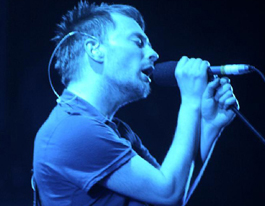home | metro santa cruz index | music & nightlife | mūz

DIY: Radiohead has hopped on the remix bandwagon with a unique release of 'Nude.'
Mūz
Geek Streak
By Curtis Cartier
Yesterday's symphony conductor has become today's DJ. With the electronic toys of the 21st century, musicians are now free to synthesize any sound their twisted minds can fathom. Forget about Tech 12 turntables; modern producers are using sine wave generators, DAT recorders and ondes martinets, a keyboard oddity from the 1920s. Modeselektor and Aphex Twin are writing homemade music software and rewiring garage appliances to create orgasm- and aneurism-producing jams.
The fact that every instrument ever made, and plenty that still haven't been made, can now be tuned and warped in infinite ways makes music a truly free art form.
Electronic music is one of the few genres still in its infancy. While techno may have been born out of disco, it's since moved more toward jazz as more and more musicians become bored with basic 4/4 structure and endless loops and begin experimenting with improvisational beat producing and creative sound manipulation. Artists like Jonny Greenwood of Radiohead, Tom Jenkinson of Squarepusher and James Tamborello of Dntel have begun to venture into the uncharted sonic seas of the computer age.
Greenwood, for instance, not only works as lead guitarist/programmer and gadget handler for Radiohead, he's also the resident studio composer for the British Broadcasting Corporation. Here's a guy who's made his name as a guitar-modifying computer geek who's been given access to a full orchestra and told to do as he pleases.
Another prime example is Imogen Heap, the English pop-vocalist/multi-instrumentalist. During her live sets, Heap is known for looping voice samples on the fly, adding stings and keys as she goes and then weaving the whole mess together into a constantly evolving ballad that still manages to sound like it could be on the O.C.
Electronic music has always been about experimentation. From the early blips and bleeps of Kraftwerk to Daft Punk and rave explosion of the '90s and on to groundbreaking albums like Kid A and Introducing—these artists have always been flying somewhat blind. And with the limitless access the Internet provides, people all over the world are experimenting with remixes and sharing them online. Recently Radiohead released "Nude" from its latest record, In Rainbows, in five parts—vocals, bass, drums, guitar, strings/fx. These separate "stems" came with an invitation from the band for listeners to remix the song in various creative ways, then post the results for the web community to judge.
One man programmed an old printer to rattle out drums, while a humming scanner played bass, a whining spectrometer crooned out strings and vocals buzzed through hard drive coils. Another used a vocal choir to bleat out string chords and bass lines while a single drum machine kept time. These came in addition to the nearly 3,000 other remixes—each different from the last—that were produced. Imagine if Beethoven had gotten hold of an Akai 5000 sequencer or had access to the completely customizable abilities of Max/MSP music production software.
The point is—without being limited by confines of an established instrument, today's musicians can realize their true musical potential. Anything that can be imagined can now be played and I, for one, can't wait to see what gets dreamed up.
Got a tip for MūZ? Email [ mailto:[email protected] ][email protected].
Send a letter to the editor about this story.
|
|
|
|
|
|